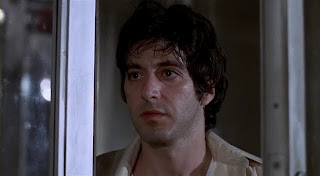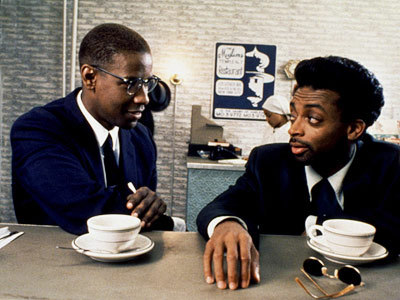Acting has never looked more physically exhausting than watching Al Pacino as Sonny Wortzik in Dog Day Afternoon. Dog Day Afternoon was released in 1975 and was directed by the legendary Sidney Lumet, who recently passed away on April 9, 2011, at the age of 86. Dog Day Afternoon was based on a true story that occurred in 1972 in New York City where a gay man and his accomplice robbed a bank in order to pay for his lover’s sex change operation. One of the taglines for the film read: “The robbery should have taken 10 minutes. 4 hours later, the bank was like a circus sideshow. 8 hours later, it was the hottest thing on live T.V. 12 hours later, it was all history. And it's all true.”
 |
| Sal (John Cazale) and Sonny |
The story takes place on one of the hottest days of the summer of 1972 in the Bronx. The hot temperature outside is an important element of the story that affects everything that happens in the film, including Al Pacino’s frantic performance as Sonny. The film opens with a robbery at a bank in the Bronx being performed by Sonny and his accomplice Sal (John Cazale). When we first meet Sonny he seems threatening and on-edge, like he’s willing to kill anyone at any moment. But once the robbery turns bad and Sonny realizes that he can’t escape the way he initially wanted, we begin to see the true nature of his character. Although, Sonny and his accomplice Sal take everyone in the bank as hostages, the hostages soon sympathize with Sonny’s cause. Sonny is doing this so he can pay for his lover’s sex change operation.
Sidney Lumet commented on the controversial nature of Pacino’s character saying, “Al was terribly nervous about doing Dog Day Afternoon. I don't think any major American star had played not only a gay guy but a gay guy who's in love with a man getting an operation to be a woman! The night before we started rehearsals his hands were shaking. He was ready to quit. I was nervous that this thing would be showing in Brooklyn on a Saturday night and some guy would shout ''Fag!'' at the screen. The only way to prevent that was to be so true to these characters that everybody couldn't help but get swept up in the movie. I think it's Al's best performance.” (link)
Pacino was not only worried about taking the role of Sonny because he was gay, but also because he knew the role would be a mental and physical challenge. Pacino had also just finished filming The Godfather Part II when he was offered the role in Dog Day Afternoon, and he told director Sidney Lumet near the start of production that he couldn't play it. Pacino was physically exhausted and depressed after The Godfather Part II shoot. He’s also a method actor and he wasn’t looking forward to the thought of working himself up to a state of near hysteria every day. Lumet unhappily accepted the actor's decision and dispatched the script to Dustin Hoffman. Pacino changed his mind when he heard that his rival was in the mix for the role. (link)
 Throughout the entire movie Sonny is sweating and appears very nervous. Which is completely appropriate given the situation he’s involved in that includes: the media, the New York City police, the FBI, and the people on the streets watching this unbelievable circus show. Pacino constantly appears frantic and is worried that he’s going to get his head blown off at any minute. The movie was written by Franklin Pierce who won an Oscar for his script, but a lot of the dialogue was improvised. Lumet who normally doesn’t like improvisation in his films felt Dog Day Afternoon would greatly benefit from improvisation and it would give the movie a more naturalistic feel so the audience would sense that this story really did happen. The most crucial improvisation that happened on the film was the famous scene where Pacino goes outside and starts yelling, “Attica! Attica! Attica!” The line refers to the Attica prison riot that happened in New York City in 1971. The line was number 86 on AFI’s (American Film Institute) list of greatest quotes from American film. It became a rallying cry for people referring to police brutality.
Throughout the entire movie Sonny is sweating and appears very nervous. Which is completely appropriate given the situation he’s involved in that includes: the media, the New York City police, the FBI, and the people on the streets watching this unbelievable circus show. Pacino constantly appears frantic and is worried that he’s going to get his head blown off at any minute. The movie was written by Franklin Pierce who won an Oscar for his script, but a lot of the dialogue was improvised. Lumet who normally doesn’t like improvisation in his films felt Dog Day Afternoon would greatly benefit from improvisation and it would give the movie a more naturalistic feel so the audience would sense that this story really did happen. The most crucial improvisation that happened on the film was the famous scene where Pacino goes outside and starts yelling, “Attica! Attica! Attica!” The line refers to the Attica prison riot that happened in New York City in 1971. The line was number 86 on AFI’s (American Film Institute) list of greatest quotes from American film. It became a rallying cry for people referring to police brutality. Al Pacino’s character was one of the first main gay characters to ever appear in a mainstream film. One of the most delicate aspects of Pacino’s performance in the movie is how he conveys that aspect of the character. He’s never flamboyant or gives any obvious mannerisms to show that the character he’s playing is a homosexual, but rather he bases his character on passion and love. Leon Sherman (Chris Sarandon), on the other hand, is the complete opposite from Sonny in that he’s very flamboyantly gay and who believes that he’s a woman in a man’s body. The contrast between the two gives the viewer greater context into the nature of Sonny and their relationship. In one of the most crucial scenes of the movie Sonny calls his lover Leon on the phone from the bank. It’s a 10-minute long scene that stays almost completely on Pacino, and it’s one of the most captivating moments in the film. This scene demonstrates Pacino’s extraordinary abilities as an actor, and like Heath Ledger would do 30 years later, his performance promoted understanding of a gay character.
While the movie as a whole is well-paced and is consistently engaging and exciting, it’s really Pacino’s performance that drives the whole movie. Throughout the entire movie Pacino has to keep up a constant energy of hysteria, paranoia, passion and drive. The audience may get exhausted just watching Pacino keeping up this constant high energy level, but never once does Pacino’s performance feel over-the-top, it feels incredibly authentic. Reportedly, halfway thru the production of the movie Pacino collapsed from exhaustion and had to be hospitalized a short time. After he completed the film, Pacino took a much deserved break off from working on movies and concentrated on his stage work for a few years.
Al Pacino has the most impressive run of films and performances of any actor. It started early in his career in 1972 with The Godfather, followed by Scarecrow, Serpico, The Godfather Part II and culminating with Dog Day Afternoon in 1975. It’s seems inconceivable to me that an actor can keep turning out great performance one after another for five films straight without getting burned out. But Pacino accomplished just that and he gave his most impressive performance at the end of that remarkable run with Dog Day Afternoon. Pacino was nominated for an Oscar for best actor for his performance, but lost out to Jack Nicholson for One Flew Over the Cuckoo’s Nest. After seven Oscar acting nominations, Pacino would finally win best actor in 1992 for A Scent of a Woman. It has since been embraced by pop culture that his win was more for his earlier work in which he should have won for. Al Pacino is one of the greatest actors to ever live, and never has his passion for acting translated to a better screen performance than his performance as Sonny Wortzik in Dog Day Afternoon.








